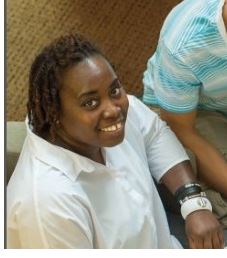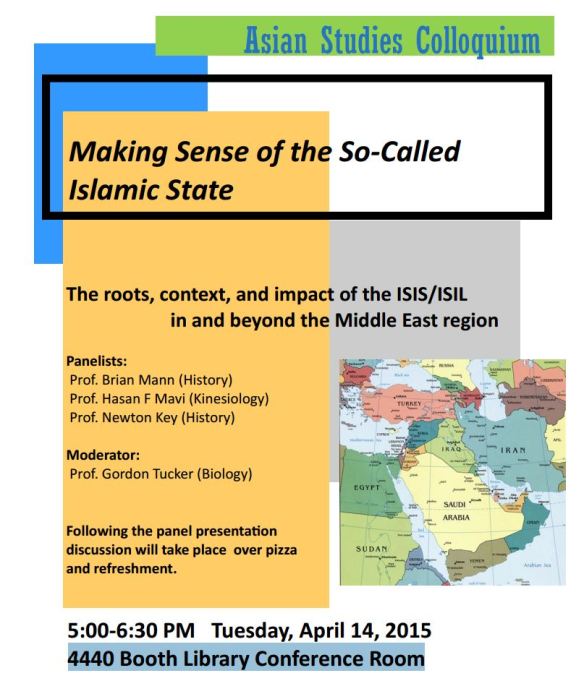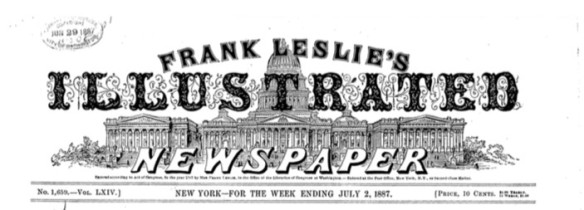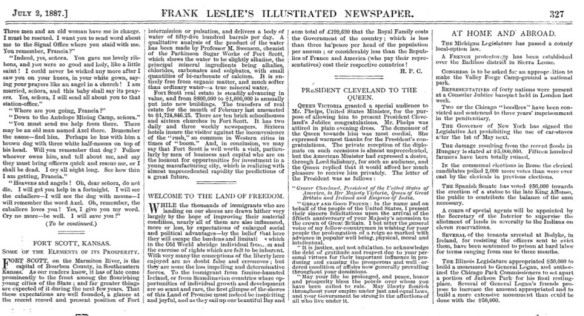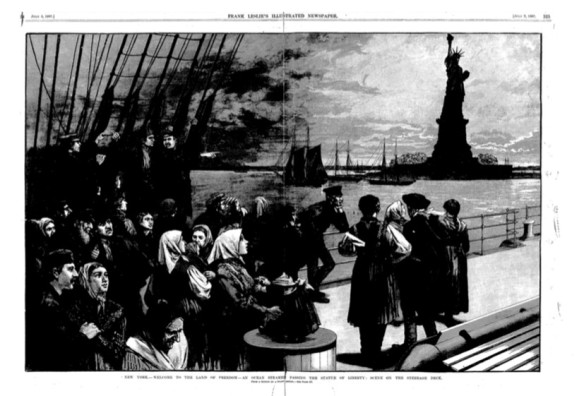Welcome to the second of a series of interviews with students and faculty of the History Department at Eastern Illinois University. For our first interview, we sat down with History with Teacher Licensure in Social Science major Ms. Jessica Nunez. Today we will chat with junior history major Mr. Quentin Spannagel, last year’s winner of the History Department’s Elisha H. and Estella Ziegler Baumgartner Scholarship (awarded to the department’s outstanding sophomore history major) and member of Phi Alpha Theta.

History@EIU: Thank you so much for taking the time to sit down and chat with us.
Quentin: No problem. Thanks so much for having me.
History@EIU: So Quentin, you’re earning your degree in history. Why did you choose history as your major?
Quentin: Originally I was History with Teacher Certification. I had great history teachers in high school history and it was something I saw myself doing. Then, I kind of changed my mind. I loved teacher cert., but it was kind of weird. I went back and forth with all sorts of stuff. I had an English minor for a little while. I had no idea what I wanted to do so I figured let’s just pick up some stuff along the way and get some random degrees! I asked myself, “What do I want to do?” I then started thinking about going into law enforcement, so I picked up a criminology minor. I still have that. When I took on the criminology minor, everyone was telling me, “You don’t need to change your major. With the minor you should be good for a law enforcement career.” I love history so I figured I’d keep it. You know, you can’t do anything with a history degree right? So at least I’d have the minor. That was my mindset going forward at the time. But then I realized you can do a lot of stuff with a history degree! You can do quite a bit with it! So thank goodness I kept the major.
History@EIU: So you’ll be finishing a year from now?
Quentin: Yes, I’m a junior so I’ll be graduating in May of next year.
History@EIU: What are your plans?
Quentin: Right now I’ve been going back and forth between pursuing an MA in Historical Administration and an MA in History. I actually have an internship right now.
History@EIU: Where?
Quentin: I work at Lincoln Log Cabin State Historic Site. I’m one of their interns there and do a bunch of stuff: greeting visitors, doing research for their exhibits, helping feed the animals, doing whatever it is they need me to do.
History@EIU: For our readers who might not be familiar with Lincoln Log Cabin, why don’t you tell us a bit about it.
Quentin: Sure. Lincoln Log Cabin is a historical preservation site that in a sense tries to carry our visitors back to the 1840’s and give them that atmosphere of what life was like back then. So we have lab interpreters who act out daily living and whole bunch of interactive exhibits. Lincoln’s father and his stepmother owned a lot of the land south of Charleston and had a cabin there. Lincoln didn’t grow up there, but when he was a lawyer, as part of his judicial circuit rounds, he visited his family out here.
History@EIU: So you said you’re going back and forth between the HA and traditional MA programs. Let’s say you do one of them, where do you see yourself in 10 years?
Quentin: I guess I’d really like to work at a museum and deal with exhibits. I actually have an internship this summer at the Korean War National Museum in Springfield. I’m really excited about that. I’m going to be working in collections, which is great for me. I have site experience, but this is something I’m not that familiar with and it’s going to be a great learning experience for me. I think I will also be doing some archive work with papers, pictures, and other materials that get donated, but mostly it will be collections. One thing I’m excited about that they do that’s really neat is they bring in war veterans to talk about their experiences. They do the same thing at Lincoln Log Cabin…well not really since there’s no one is around from the 19th century!…but they do have workshops where they bring in people to make it more “real” for the visitors. At the Lincoln Log Cabin dinner recently we had an interpreter come in who read Walt Whitman poetry –
History@EIU: – “O Captain! My Captain!”?
Quentin: Of course! He opened and closed with that! But then again, I don’t know. The traditional MA program is something I’d love to pursue too! Actually I’m in a grad seminar this semester with Dr. Wehrle.
History@EIU: Which seminar?
Quentin: Diplomatic History. It’s for Departmental Honors. You have to take a seminar and then do your thesis.
History@EIU: Let’s talk a little bit about Departmental Honors. Tell us a bit about it and why you chose to pursue it.
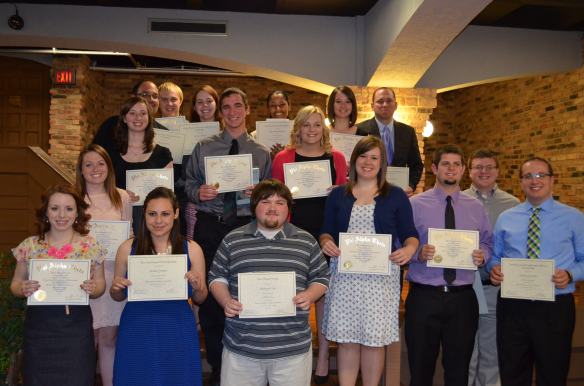
Quentin and classmates being initiated into the Phi Alpha Theta Honor Society at the 2014 banquet
Quentin: Well I chose to do it because it sounded pretty cool and my grades were too high not to do it so I figured what do I have to lose! Pretty much what you do is you work with a faculty member and focus on one aspect of a certain topic and really hone in – it’s kind of like being at the graduate level where you are doing much more extensive research than you typically do in an undergraduate setting.
History@EIU: So what else does Departmental Honors entail?
Quentin: A lot of reading!
History@EIU: A lot of reading?!
Quentin: A lot of reading! And a lot of research – going through different archives and materials. Right now what I’ve been doing is, and I’m still in the preliminary stages of my research, but what I’ve been doing is going through the New York Times and Chicago Tribune to start. My topic is on President Kennedy and diplomatic relations with China, in particular regarding the issue of Taiwan. There’s also many sources on Kennedy himself I’m looking at.
History@EIU: So how long is the entire process?
Quentin: It is three courses. What you really do is you work with two different professors. The first course is extensive reading and research. You just dive into the secondary literature and fully immerse yourself in the topic. I did that course with Dr. Lee over the summer – her specialty is Modern Asia so it worked out great. Then, the next two classes – one is the research course where you really go out and find and evaluate your sources. The writing course follows which is when you put it altogether. So when all is said and done you end up with a thesis of 50-60 pages. You can look down and say this is my project, this is my baby.
History@EIU: Excited?
Quentin: Yes, I’m very excited. It’s a really interesting topic.
History@EIU: So will you be finishing the thesis up in the fall or the spring next year?
Quentin: Spring. Actually it’s been really great. Dr. Wehrle has been working with me and in the graduate seminar where you have to write this really big paper at the end of the semester, my paper will serve as a kind of draft of the first chapter of my thesis. It looks at Kennedy during his time in the House and Senate and how his views toward China and Taiwan evolved during that time. Then the rest of the thesis will focus on his time as president.
History@EIU: Do you usually do the grad course in the second semester? Wouldn’t that be in the Fall next year?
Quentin: Yes, you usually do it in the second semester of the honors sequence, but since I’m doing it on diplomacy, and Dr. Wehrle was teaching his Diplomatic History seminar this semester, I’m doing it out of sequence a bit. The course was too perfect to pass up. It’s actually working out great – it’s really giving me a good framework with which to approach my topic.
History@EIU: It sounds like diplomatic history is your bread and butter. Based on your topic of interest, is it safe to assume 20th century is the time period you like to focus on? Then again, it seems like you have a love for 19th century history too since you’re working at the Lincoln Log Cabin.
Quentin: It’s true. I love all of it. I find the Civil War really interesting. But I really like it all. It’s the topics we didn’t get to cover much, if at all, in high school that I really am drawn to. I mean, before I got to college, I didn’t even know what Taiwan was! I thought it was an island near Hawaii where you’d go on vacation! I didn’t realize it had this great history and has and continues to play such an important role in the world.
History@EIU: The whole China-Taiwan situation is kind of a mess isn’t it?
Quentin: Yea, it’s been kind of a mess since ’49!
History@EIU: Have you ever had a moment in a history class where you just sat back and thought wow, I’m so glad I study history?
Quentin: Well…one moment was actually in your (Professor Mann’s) Modern Middle East class –
History@EIU: – Ooooo, I (Professor Mann) like this answer already. But come on Quentin, be honest –
Quentin: – No! Seriously! We were looking at the Muslim Brotherhood in class and for my project I was looking into Sayyid Qutb – what he said and how his ideas were so influential on Islamist movements and jihadist groups around the world since his time up to today. I was like wow, history isn’t just this random thing we study – it has global implications which have affected not just the world we live in but my own life in a direct way.
History@EIU: So bouncing off what you just said, what have been some of your other favorite history courses here at Eastern?
Quentin: There’s been quite a few. I really liked the Civil War course I took with Dr. Hubbard. I’ve always found the Civil War interesting and looking at the less drawn out aspects of it was great.
History@EIU: Like what in particular?
Quentin: I really liked looking at Lincoln and how he was so strategic about what he did. Whether that was suspending habeas corpus or putting Maryland under martial law. He kind of had a master plan. Those actions might not paint him in the best light, but he was really pragmatic about what he was doing. I really loved History of Christianity with Dr. Kammerling too. It shattered a lot of my preconceptions about Christianity and its history. I definitely also love the seminar I’m doing right now with Dr. Wehrle. I like it because it’s informal – you’re learning together like as a team. It’s so much reading, but we’re all kind of suffering together!
History@EIU: Isn’t it interesting how a grad seminar is very different from an undergraduate course, even an upper level one?
Quentin: Yes, it is so different! It’s so much fun.
History@EIU: So besides your coursework, what other activities are you involved with in the department?
Quentin: Well, I’m actually involved in a lot of different things. I just found out that a paper of mine will be published in the next issue of Historia, the department’s journal. I’ll be a published historian! So that’s exciting. I’m also an active member of the History Club, which is a lot of fun. We’re going to be going to Springfield this weekend and I’m really looking forward to the trip.

Quentin with the History Club in Springfield, IL
Quentin: I’m also involved in the new History Ambassadors program. I got to go back to my high school to talk to students about how great the History Department at Eastern is and how much I enjoy it and how they should seriously think about majoring in history wherever they choose to go go to college.
History@EIU: That’s excellent. Sounds like you are doing all sorts of things. Are you involved in any other activities on campus but outside the department?
Quentin: Yes. I actually had the opportunity to present a paper, one I wrote on the Taiwan Relations Act of 1979 that President Carter signed into law that year, at the annual Asian Studies Conference last year.

Quentin presenting at the Asian Studies conference at EIU in 2014
Quentin: Outside of my studies I’m very involved with the Newman Center. I help out there when I can. I actually helped run the St. Hedwig Haus of Hospitality for Women and Children, which is a shelter for women and children. I was a live-in worker for a year.
History@EIU: So the St. Hedwig Haus was your housing on campus?
Quentin: Yes, it actually was. It was pretty nice. I basically paid for my room and board with my labor. I’d help keep things organized and solve issues that arose. Once this semester started up though, I realized I can’t do everything. Unfortunately that was one of the first things to go on the chopping block. It was a really cool experience though. I still work over at Newman and I’m still very involved.
History@EIU: So it sounds like you’re really busy with your coursework, department and campus activities, and your internship. What do you do spare time to unwind?
Quentin: Video games, especially since it’s been so cold lately!
History@EIU: Are you an Xbox guy or a Playstation guy?
Quentin: Xbox. I’m playing that thing till it dies on me. I have one of the old ones that looks and feels like a brick. I think when I upgrade I’m going to go PS4.
History@EIU: Good choice. I’m sure you do other things besides play video games on your down time though.
Quentin: Of course. I love listening to music. I’ve been on kind of an alternative music kick lately.
History@EIU: Oh, like what?
Quentin: I’ve been listening to a lot of Foster the People and MGMT. You know that whole electro-indie kind of thing. I also love fishing. Now that it’s getting nice out I’m going to start going out again. There’s a few great fishing spots around Charleston. Sometimes we go out and fish from the shore, but I have a buddy who has a boat so we’ll take that out on the water and the fishing out there is a little better. But for the most part I just go for bluegill because they’re easy to catch.
History@EIU: Bluegill?
Quentin: Yea! Illinois’ state fish!
History@EIU: I did not know that! Are they edible? Do they taste good?
Quentin: Eh….
History@EIU: <laugh>
Quentin: Ok, they aren’t the best, but they aren’t bad! Mostly I just catch them and throw them back. It’s more of a rest and relaxation thing.
History@EIU: Quentin, thank you so much for taking the time to speak with us. It was great to hear about your experience in the department and to learn more about you and what you do. We wish you the best of luck with your exciting thesis project, the rest of the year, and beyond.
Quentin: Thank you so much and thanks for inviting me to talk with you!
 session brought together veterans who shared their perspectives on a process that people seem to love to hate – general education. I talked about the philosophy of general education, about differences between top-down and department-driven curriculum reform, and about methods that can engage students in the U.S. History survey since 1876. Other panelists talked about incorporating ethical conundrums (Robert Sampson, Millikin University) and about maintaining high standards (Maureen Nutting, North Seattle Community College).
session brought together veterans who shared their perspectives on a process that people seem to love to hate – general education. I talked about the philosophy of general education, about differences between top-down and department-driven curriculum reform, and about methods that can engage students in the U.S. History survey since 1876. Other panelists talked about incorporating ethical conundrums (Robert Sampson, Millikin University) and about maintaining high standards (Maureen Nutting, North Seattle Community College). women of John Brown’s family, the subject of Laughlin-Schultz’ award-winning, The Ties that Bound Us: The Women of John Brown’s Family and the Legacy of Radical Feminism (Cornell, 2014) would have plenty of things to talk about with Mrs. Dred Scott. It sounds like an interesting possibility in light of the upcoming 150th anniversary of Reconstruction. Malgorzata Rymsza-Pawlowska presented at the OAH as well, in a session entitled “Working across Spaces of History Pedagogy: Classroom, Exhibit, Community.” She met David Thelen at her session. He co-wrote The Presence of the Past: Popular Uses of History in American Life (Columbia, 1998), a book that the Historical Administration graduate students were assigned as summer reading last year.
women of John Brown’s family, the subject of Laughlin-Schultz’ award-winning, The Ties that Bound Us: The Women of John Brown’s Family and the Legacy of Radical Feminism (Cornell, 2014) would have plenty of things to talk about with Mrs. Dred Scott. It sounds like an interesting possibility in light of the upcoming 150th anniversary of Reconstruction. Malgorzata Rymsza-Pawlowska presented at the OAH as well, in a session entitled “Working across Spaces of History Pedagogy: Classroom, Exhibit, Community.” She met David Thelen at her session. He co-wrote The Presence of the Past: Popular Uses of History in American Life (Columbia, 1998), a book that the Historical Administration graduate students were assigned as summer reading last year.






